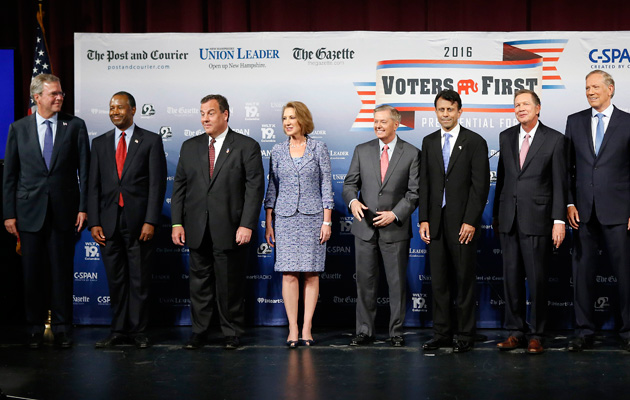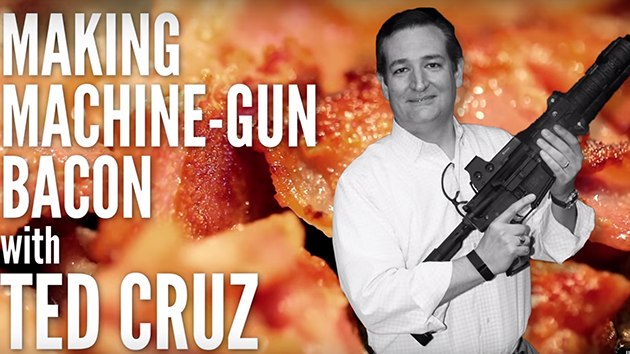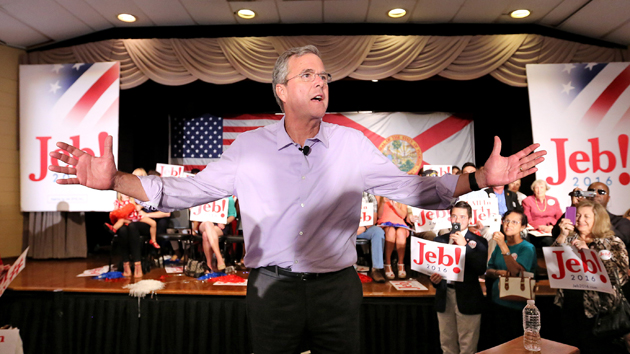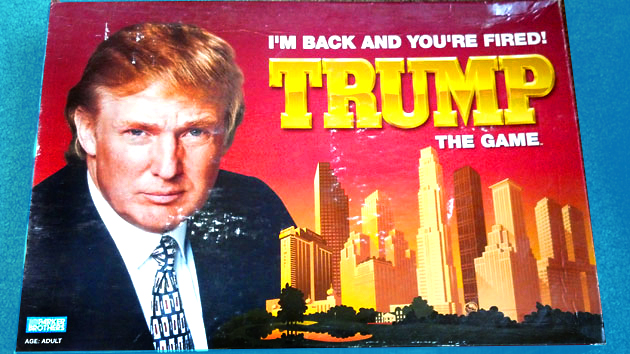
Yalta.Jim Cole/Associated Press
So this is what it looks like when Donald Trump stays home. The businessman and board game magnate, who is currently leading the Republican presidential field by a mile, skipped the first full candidate forum of the 2016 presidential race on Monday in New Hampshire. His official reason: the host newspaper, New Hampshire’s Union-Leader, had already signaled that it wasn’t interested in endorsing his campaign. But maybe he had an inkling of what we know for certain now—14 candidates racing against the clock to recite canned talking points makes for a total snoozefest.
The moderator, Jack Heath, deliberately steered clear of any Trump-related questions, which is a shame, because Trump, even in absentia, might have have at least forced the candidates to talk about something besides themselves. As it was, Monday’s forum, the first of three such Q&A sessions in early primary states and a dress rehearsal of sorts for the first GOP debate on Thursday, was like freshman orientation in a class of introverts. The candidates were provided the most generic of icebreaker questions (Carly Fiorina was asked for an example of a time she showed leadership), which they promptly segued away from, and pivoted to the boilerplate speeches they’ve already been delivering in Iowa and New Hampshire for months. Because it was a forum, not a debate, the candidates weren’t allowed to interact with each other. Save for Scott Walker noting that no one in his family had been president before, none of them even tried. In a rare moment of drama, the C-SPAN cameras caught Chris Christie with a finger (his) wiggling in his ear.
But there were still a handful of highlights:
- Four years after famously forgetting the third federal agency he intended to eliminate, former Texas governor Rick Perry was offered a shot at a do-over. “I’ve heard this question before!” he said eagerly. Then he pivoted to another topic and never answered it.
- Jeb Bush said the president needs to do more to combat the “barbarians” of ISIS, but perhaps wary of unpleasant comparisons to that other Bush (or both of them, really), stopped short of saying “boots on the ground” were needed in the Middle East beyond special forces troops.
- Fortunately, South Carolina Sen. Lindsey Graham was happy to do just that, calling on an America-Turkish-Egyptian force to bring Syria back under control. He’d tell those allies, “You’re gonna pay for this war, we paid for the last two. We are gonna pull the caliphate up by its roots.”
- Graham, who could surely use the boost, also got a laugh from the audience when he suggested that the solution to Washington’s gridlock was to “drink more.”
- Ben Carson announced that he would reform the tax code by consulting with “the fairest individual in the universe—that would be God.” The result, he explained, would be a base tax rate of around 10 to 15 percent, similar to a church tithe. But an hour later, he informed the audience that taking more than 10 percent of a billionaire’s income is “called socialism.”
- Louisiana Gov. Bobby Jindal said President Obama has “declared war on trans-fats and a ceasefire with the world’s largest state sponsor of terrorism.” (That would be Iran.) His first act as president: hold a huge meeting with the Joint Chiefs to announce that America “is back.”
- Much has been made of the Republican party’s recent shift toward criminal justice reform, which includes lighter sentencing for many drug crimes. But Florida Sen. Marco Rubio offered a snapshot on how elements of the party might push back. Seizing on northern New England’s heroin epidemic, he reprised an argument that any legalization of marijuana except for strictly medicinal uses would only contribute to drug abuse. Expect this to come up again at a later date, when candidates are allowed to talk to each other.
- How will the next president’s policies on climate change be affected by the White House’s big new plan to fight global warming? We still have no idea, because only one candidate was asked about the proposal, and then only in passing. For the record, Wisconsin Gov. Scott Walker says it will be a “buzzsaw to the nation’s economy.”













